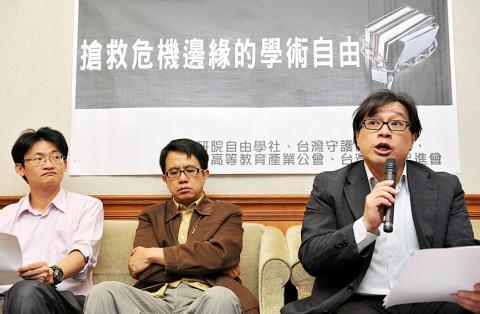Academics yesterday hit back at Chinese Nationalist Party (KMT) Legislator Alex Tsai’s (蔡正元) threat to cut the budget of Academia Sinica’s Institutum Jurisprudentiae, after researchers spoke out against Want Want China Times Group’s (旺旺中時集團) plan to purchase a cable services network.
Want Want’s plan to acquire the cable TV services owned by China Network Systems (CNS, 中嘉網路), a NT$76 billion (US$2.57 billion) merger that could affect a quarter of television-owning households nationwide, has sparked concern among the public, rights activists and academics who fear that it could lead to a media monopoly, which would compromise freedoms of the press and of expression.
Upset that many Academia Sinica researchers — especially those from the Institutum Jurisprudentiae — have opposed the merger, Tsai said at the legislature’s Education and Culture Committee meeting last week that he would propose cutting the budget for the institute, adding that academics should not be involved in a “purely commercial merger” and that they were politically motivated.

Photo: Chien Jung-feng, Taipei Times
Academics yesterday said that Tsai’s threat was a breach of freedom of expression.
“It’s a positive thing for academics to be concerned about public issues and make comments about them,” Academia Sinica’s Institute of Sociology research fellow Lin Thung-hong (林宗弘) told a news conference at the Legislative Yuan. “It’s regrettable that politicians are trying to curb academics’ freedom to speak on public issues.”
Lin added that if big businesses and politicians worked together to restrict academics’ freedom of speech through judicial or legislative means, “it would spark a huge crisis in Taiwan.”
Chen Kui-hsien (陳貴賢), a research fellow at Academia Sinica’s Institute of Atomic and Molecular Sciences, accused “some politicians” of “trying to make academics purely academic through threats to cut budgets.”
“We have to let the politician know that what he is doing is beyond the power of a legislator,” Chen said. “We need more academics to play a professional and active role in public affairs.”
Wu Rwei-ren (吳叡人), a member of Academia Sinica’s Liberty Society, called on President Ma Ying-jeou (馬英九), who doubles as the KMT chairman, to clearly speak out against curbing freedom of expression and to stop KMT lawmakers such as Tsai from threatening academics.
Asked about the academics’ protest, Tsai said that even if Want Want China Times Group is indeed pro-China, there is no law stipulating that a pro-China group could not engage in the media business.
Tsai said he was not taking the side of Want Want China Times Group. He said he was merely confining the discussion to the matter at hand and that it was the people at the Academia Sinica who were not clear what the issues are.
The Chinese-language China Times, a subsidiary of Want Want China Times Group, ran an opinion piece yesterday saying it was within a lawmaker’s authority to cut a government agency’s budget, but that it would also need to go through a collegiate system in the legislature.
It added that academics clamor for freedom of expression and yet are oblivious to others’ rights, with their launching of a petition to exert pressure on Tsai.
Additional reporting by Shih Hsiao-kuang

MAKING WAVES: China’s maritime militia could become a nontraditional threat in war, clogging up shipping lanes to prevent US or Japanese intervention, a report said About 1,900 Chinese ships flying flags of convenience and fishing vessels that participated in China’s military exercises around Taiwan last month and in January have been listed for monitoring, Coast Guard Administration (CGA) Deputy Director-General Hsieh Ching-chin (謝慶欽) said yesterday. Following amendments to the Commercial Port Act (商港法) and the Law of Ships (船舶法) last month, the CGA can designate possible berthing areas or deny ports of call for vessels suspected of loitering around areas where undersea cables can be accessed, Oceans Affairs Council Minister Kuan Bi-ling (管碧玲) said. The list of suspected ships, originally 300, had risen to about 1,900 as

Japan’s strategic alliance with the US would collapse if Tokyo were to turn away from a conflict in Taiwan, Japanese Prime Minister Sanae Takaichi said yesterday, but distanced herself from previous comments that suggested a possible military response in such an event. Takaichi expressed her latest views on a nationally broadcast TV program late on Monday, where an opposition party leader criticized her for igniting tensions with China with the earlier remarks. Ties between Japan and China have sunk to the worst level in years after Takaichi said in November that a hypothetical Chinese attack on Taiwan could bring about a Japanese

MORE RESPONSIBILITY: Draftees would be expected to fight alongside professional soldiers, likely requiring the transformation of some training brigades into combat units The armed forces are to start incorporating new conscripts into combined arms brigades this year to enhance combat readiness, the Executive Yuan’s latest policy report said. The new policy would affect Taiwanese men entering the military for their compulsory service, which was extended to one year under reforms by then-president Tsai Ing-wen (蔡英文) in 2022. The conscripts would be trained to operate machine guns, uncrewed aerial vehicles, anti-tank guided missile launchers and Stinger air defense systems, the report said, adding that the basic training would be lengthened to eight weeks. After basic training, conscripts would be sorted into infantry battalions that would take

DEEP-STRIKE CAPABILITY: The scenario simulated a PLA drill that turned into an assault on Taiwan’s critical infrastructure, with the launchers providing fire support Taiwan yesterday conducted this year’s first military exercises at Longsiang Base in Taichung, demonstrating the newly acquired High Mobility Artillery Rocket System’s (HIMARS) ability to provide fire support and deep-strike capabilities. The scenario simulated an attack on Penghu County, with HIMARS trucks immediately rolling into designated launch areas and firing barrages at the Wangan (望安) and Cimei (七美) islands, simulating the provision of fire support against invading forces. The HIMARS are supposed to “fire and leave,” which would significantly increase personnel and equipment survivability, a military official said. The drill simulated an exercise launched by the Chinese People’s Liberation Army (PLA) Eastern